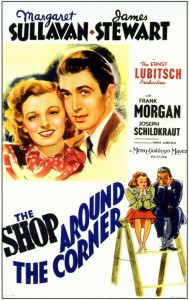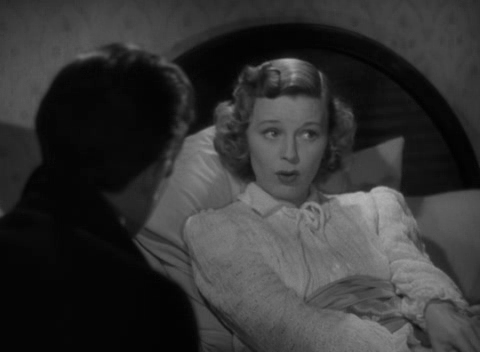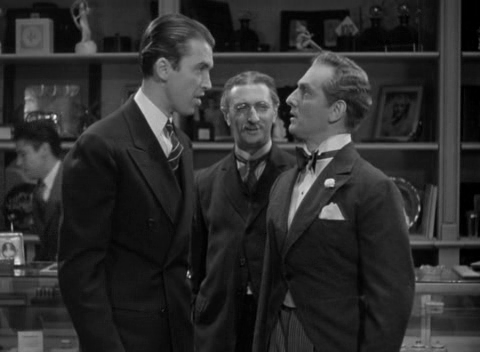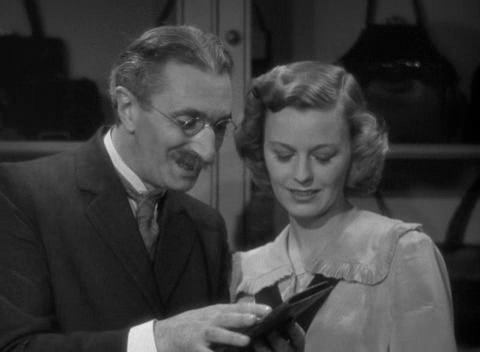Shop Around the Corner, The (1940)
“Just a lovely average girl; that’s all I want.”
|
Synopsis: |
|
Genres, Themes, Actors, and Directors:
Response to Peary’s Review: The subplot involving Morgan’s discovery of his wife’s infidelity plays an important role in the overall storyline (and it’s wonderful to see Morgan given such a meaty, nuanced part) — but at the heart of the film lies the love-hate relationship that develops between Stewart and Sullavan. We know from the beginning that they are each others’ secret paramours, and Stewart finds out roughly half-way through the film — so the crux of the narrative tension revolves around how, when, or if Stewart will choose to reveal what he’s discovered. To that end, the scene in which Stewart initially learns about Sullavan’s identity is decidedly bittersweet; Sullavan’s reaction to Stewart “barging in” on her intended rendezvous shows her in a surprisingly negative light, and it took me a while to understand how Stewart could so easily forgive her and reconcile her “real life” persona with the one she’d revealed to him in letters (there’s clearly more going on in his mind than we’ve privy to). Ultimately, however, their complicated dance of gradual recognition rings true — now more so than ever, as more and more individuals (myself included) meet their beloved in virtual reality before encountering one another in person. Film fanatics should certainly check out this finely acted, expertly directed human comedy at least once. Note: Laszlo’s play was remade two more times — first as the Judy Garland/Van Johnson musical In the Good Old Summertime (1949), and later as You’ve Got Mail (1993), starring Tom Hanks and Meg Ryan; neither is must-see viewing. Redeeming Qualities and Moments:
Must See? Categories
Links: |





One thought on “Shop Around the Corner, The (1940)”
A no-brainer must – a thoroughly captivating film, perfectly realized, which holds up well to repeat viewings.
Scripts don’t really come much better than this crackerjack one by Samson Raphaelson – compact, concise with equal measurements of genuine wit and deeply felt emotion. With such a solid base to work with, Lubitsch is given rein for one of his best films. The attention paid to both production effect and character development results in a genuine ‘feel good’ flick – something I’m not usually quick to mention or hold in particularly high regard. I especially like how attentive Lubitsch is here to dialogue delivery – there are quite a few instances in which various characters need to get out wordy bits of information; Lubitsch has his actors sail right through these sections, confident that audiences will pick everything up because he has helped them to completely invest in and care about who is talking. One certainly *feels* Lubitsch in this film at all times – and, yet, simultaneously, his famous *touch* is not felt as intrusive. All of the emotion here is felt as genuine and natural – and it’s rather moving whenever Lubitsch encourages his cast to go low-key, which invites us in intimately.
‘TSATC’ moves rather quickly – it’s likely you will not feel the time passing at all. There is no filler and whatever is here needs to be here, and nothing more. The sharpness of everything from movement to nuance to information puts this film in a master class of filmmaking.
The cast is simply marvelous – and the director brings each individual alive with detail and timing. Among the supporting cast, Bressart and (esp. a more reserved) Morgan are, indeed, standouts but, it’s true, one really does sense that the shop workers have more or less bonded like family in many ways.
Sullavan (who really only made a handful of major films) and Stewart (who turns in particularly subtle work) are simply a joy to watch here. They make for one of the most unique couples in cinema history – and it’s a delight from start to finish (esp. near the finish) to be in their company.